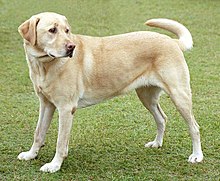개
| ||||||||||
| 개객갞갟갠갡갢 갣갤갥갦갧갨갩 갪갫갬갭갮갯갰 갱갲갳갴갵갶갷 | |
| 가 ← | → 갸 |
|---|---|
Jeju
[edit]Pronunciation
[edit]| Romanizations | |
|---|---|
| Revised Romanization? | gae |
| Revised Romanization (translit.)? | gae |
| Yale Romanization? | kay |
Etymology 1
[edit]Inherited from Middle Korean 가히〮 (kàhí), from Old Korean 犬伊 (*KAhi).
Noun
[edit]개 (gae)
Etymology 2
[edit]From Middle Korean 개〮 (káy).
Noun
[edit]개 (gae)
Korean
[edit]Etymology 1
[edit]First attested in the Jīlín lèishì (鷄林類事 / 계림유사), 1103, as Late Old Korean 家稀. From Old Korean 犬伊 (*KAhi).
In the hangul script, first attested in the Worin cheon'gangjigok (月印千江之曲 / 월인천강지곡), 1449, as Middle Korean 가히〮 (Yale: kàhí), and subsequently recorded as 개〯 (Yale: kǎy) in the 16th century, after the h had dropped.[1]
The prefix derives from the noun. Compare English bitch.

A dog
Pronunciation
[edit]- (SK Standard/Seoul) IPA(key): [kɛ(ː)] ~ [ke̞(ː)]
Audio: (file)
- Phonetic hangul: [개(ː)/게(ː)]
- Though still prescribed in Standard Korean, most speakers in both Koreas no longer distinguish vowel length.
| Romanizations | |
|---|---|
| Revised Romanization? | gae |
| Revised Romanization (translit.)? | gae |
| McCune–Reischauer? | kae |
| Yale Romanization? | kāy |
- South Gyeongsang (Busan) pitch accent: 개의 / 개에 / 개까지
Syllables in red take high pitch. This word always takes low pitch, and heightens the pitch of two subsequent suffixed syllables.
Noun
[edit]- dog
- (figuratively, derogatory) someone behaves badly
- (figuratively) someone who does the bidding of another
Usage notes
[edit]- Some younger speakers prefer 강아지 (gang'aji, “puppy”) to refer to dogs of any age, to avoid the vulgar connotations of the prefix.
Derived terms
[edit]Related terms
[edit]- 강아지 (gang'aji)
See also
[edit]Prefix
[edit]개— • (gae-)
- (vulgar, slang) fucking (as an intensifier)
- 개웃기네
- gaeutgine
- so fucking funny
- wild; worthless; of inferior quality
Usage notes
[edit]The prefix traditionally has a disparaging meaning only, but in modern slang it is used as a general vulgar intensifier regardless of the semantics involved.
Derived terms
[edit]- 개고생 (—苦生, gaegosaeng)
- 개꼴 (gaekkol)
- 개꽃 (gaekkot)
- 개꿀 (gaekkul)
- 개꿈 (gaekkum)
- 개나리 (gaenari)
- 개년 (gaenyeon)
- 개놈 (gaenom)
- 개떡 (gaetteok)
- 개망신 (—亡身, gaemangsin)
- 개밀 (gaemil)
- 개방정 (gaebangjeong)
- 개보리 (gaebori)
- 개살구 (gaesalgu)
- 개수작 (—酬酌, gaesujak)
- 개여뀌 (gaeyeokkwi)
- 개이득 (—利得, gaeideuk)
- 개죽음 (gaejugeum)
- 개지랄 (gaejiral)
- 개판 (gaepan)
- 갯잔디 (gaetjandi)
Etymology 2
[edit]First attested in the Bullyu dugongbu si eonhae (分類杜工部詩諺解 / 분류두공부시언해), 1481, as Middle Korean 개〮 (Yale: káy).
Pronunciation
[edit]- (SK Standard/Seoul) IPA(key): [kɛ] ~ [ke̞]
Audio: (file)
- Phonetic hangul: [개/게]
| Romanizations | |
|---|---|
| Revised Romanization? | gae |
| Revised Romanization (translit.)? | gae |
| McCune–Reischauer? | kae |
| Yale Romanization? | kay |
Noun
[edit]개 • (gae)
Derived terms
[edit]See also
[edit]Etymology 3
[edit]Sino-Korean word from 個.
Pronunciation
[edit]- (SK Standard/Seoul) IPA(key): [kɛ] ~ [ke̞]
Audio: (file)
- Phonetic hangul: [개/게]
| Romanizations | |
|---|---|
| Revised Romanization? | gae |
| Revised Romanization (translit.)? | gae |
| McCune–Reischauer? | kae |
| Yale Romanization? | kay |
Counter
[edit]Derived terms
[edit]- See the hanja entry at 個 for Sino-Korean compounds of 개 (個, gae).
Etymology 4
[edit]See the main entries.
Verb
[edit]개 • (gae)
- An infinitive form of 개다 (gaeda, “to clear”)
- An infinitive form of 개다 (gaeda, “to fold”)
- An infinitive form of 개다 (gaeda, “to knead”)
Etymology 5
[edit]Korean reading of various Chinese characters.
Syllable
[edit]개 (gae)
- 改: reform; fix
- 皆: (literary) all; every; everybody
- 個: a piece; a unit; an item
- 開: open
- 介: mediate; herald; sea shell; to wear armor
- 慨:
- 槪: approximately
- 蓋: cover
- 价:
- 凱:
- 愷: enjoy; peaceful
- 漑:
- 塏: highland; high and dry (of place)
- 愾:
- 疥: scabies, itch
- 芥:
- 豈: an interjection of surprise
- 鎧:
- 玠:
- 剴:
- 匃:
- 揩:
- 槩:
- 磕: bump; drumbeat
- 闓:
- 丐: beggar
- 箇: Alternative form of 個
- 个: Alternative form of 個
- 盖: Alternative form of 蓋
References
[edit]Middle Korean
[edit]Etymology 1
[edit]Pronunciation
[edit]Noun
[edit]개〮 (káy) (locative 개〮예〮 (káy-yéy))
Descendants
[edit]- Korean: 개 (gae)
Etymology 2
[edit]Pronunciation
[edit]Noun
[edit]개〯 (kǎy) (locative 개〯예〮 (kǎy-yéy))
Descendants
[edit]- Korean: 개 (gae)
- Character boxes with compositions
- Hangul Syllables block
- Hangul script characters
- Jeju terms with IPA pronunciation
- Jeju terms inherited from Middle Korean
- Jeju terms derived from Middle Korean
- Jeju terms inherited from Old Korean
- Jeju terms derived from Old Korean
- Jeju lemmas
- Jeju nouns
- jje:Dogs
- Korean terms inherited from Late Old Korean
- Korean terms derived from Late Old Korean
- Native Korean words
- Korean terms inherited from Old Korean
- Korean terms derived from Old Korean
- Korean terms inherited from Middle Korean
- Korean terms derived from Middle Korean
- Korean terms with long vowels in the first syllable
- Korean terms with audio links
- Korean terms with IPA pronunciation
- Korean terms with dialectal pitch accent marked
- Korean lemmas
- Korean nouns
- Korean derogatory terms
- Korean terms with usage examples
- Korean prefixes
- Korean vulgarities
- Korean slang
- Sino-Korean words
- Korean counters
- Korean non-lemma forms
- Korean verb forms
- Hanja readings
- Korean literary terms
- ko:Dogs
- Middle Korean terms with IPA pronunciation
- Middle Korean lemmas
- Middle Korean nouns